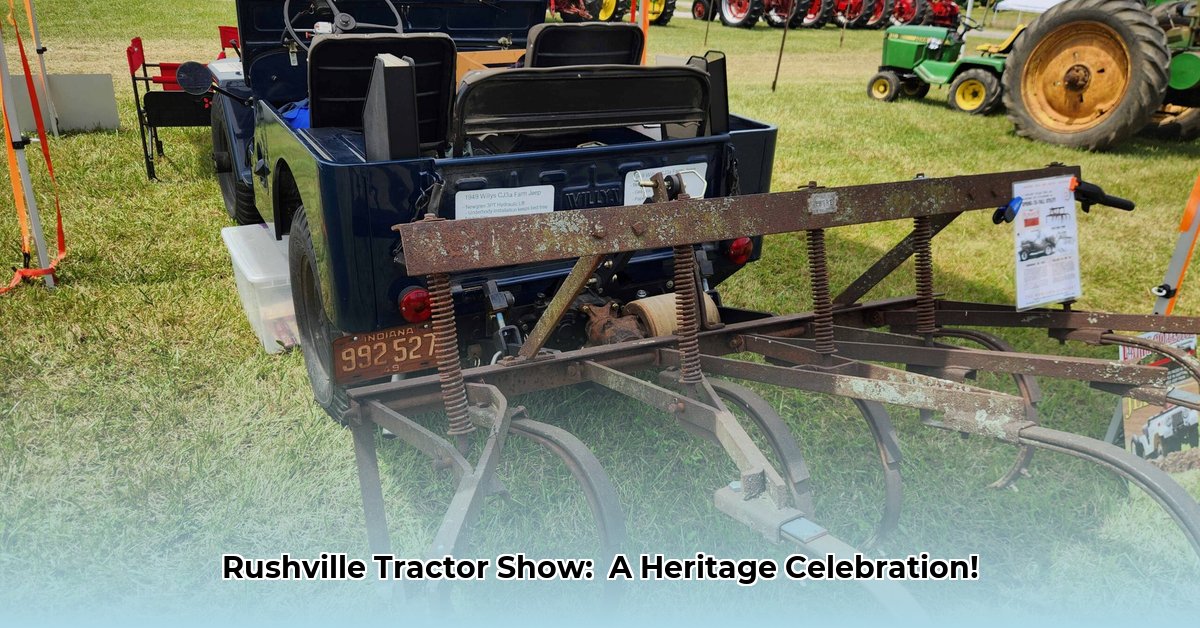
The Rushville, Indiana Tractor Show isn't just about gleaming metal and roaring engines; it's a vibrant tapestry woven from agricultural history, community spirit, and a shared passion for preserving the past. This year's event, a resounding success with an estimated attendance of over 10,000, showcased more than 250 antique tractors, highlighting the enduring legacy of Indiana farming. But beyond the impressive machinery, the true heart of the show pulsed in the connections forged among families, farmers, collectors, and enthusiasts, united by a deep appreciation for agricultural heritage. For more tractor events, check out this link to other events.
A Journey Through Time and Innovation
Walking among the meticulously restored tractors—from vintage John Deere classics to powerful Allis-Chalmers models—was like traversing decades of agricultural innovation. A fully restored 1940s Allis-Chalmers stood as a testament to the engineering marvels of its time, a stark yet fascinating contrast to its modern counterparts. This juxtaposition serves as a powerful reminder of how far technology has advanced while emphasizing the enduring contributions of the past. Experts were readily available, sharing insightful stories and answering questions about each tractor's history and mechanics, enriching the experience for attendees. Why is this connection to the past so important? Because it underscores the invaluable knowledge and experience that continue to shape modern farming practices.
"It's not just about the tractors," said Sarah Miller, a lifelong Rushville resident and volunteer at the show. "It's about the people, the stories, and the legacy they represent." This sentiment encapsulates the essence of the Rushville Tractor Show perfectly. It is a testament to the human element driving the event's success and significance.
Community Spirit and Economic Impact
This year's show wasn’t solely about admiring antique farm equipment; it served as a vital hub for community interaction and economic growth. Farmers, collectors, and families gathered, sharing stories, exchanging ideas, and strengthening the bonds that hold rural communities together. The event fostered a sense of shared heritage and collective pride, a crucial factor in maintaining the vibrancy of small-town America. Beyond its cultural significance, the show also played a vital role in boosting the local economy. The influx of visitors from across the state and beyond filled local hotels, restaurants, and shops, generating a significant economic ripple effect. This economic injection demonstrates the potent combination of cultural preservation and economic opportunity. How might communities across the nation harness such powerful synergies?
Preserving Agricultural Heritage for Future Generations
The Rushville Tractor Show's impact extends far beyond its immediate economic benefits. By preserving and celebrating agricultural history, the event ensures that this invaluable legacy isn't lost. It acts as a powerful educational tool, connecting younger generations with their farming roots in a way that conventional history lessons often can't. In a world increasingly detached from its food sources, this event provides an essential link to the past, fostering a deeper understanding of where our food comes from and how it is produced.
"We have a responsibility to preserve our agricultural heritage for future generations," noted Dr. Thomas Evans, Professor of Agricultural History at Purdue University. "Events like the Rushville Tractor Show are vital in keeping those stories alive and relevant." This event serves as a beacon, highlighting the importance of keeping our agricultural history alive for the benefit of years to come. What initiatives might expand this important role?
Sustainable Funding for Future Shows
The success of the Rushville Tractor Show hinges on sustained funding, requiring a multifaceted approach to ensure its long-term viability. Securing funding through a variety of channels, such as government grants, private donations, and community fundraising, is critical. The show’s organizers have successfully utilized this strategy, but the pursuit of sustainable funding is an ongoing process requiring consistent effort and creative fundraising strategies. How might other organizations dedicated to preserving agricultural heritage benefit from the Rushville model?
Key Highlights:
- Over 10,000 attendees enjoyed the 2024 show.
- More than 250 antique tractors were on display.
- The event generated considerable economic activity in the Rushville area.
- The show serves as a crucial link to agricultural history, educating and engaging visitors of all ages.
The Rushville Tractor Show is more than just an annual event; it's a testament to the power of community, the importance of preserving history, and the enduring spirit of Indiana's agricultural heritage. As it continues to grow and evolve, it stands as an inspiring model for future heritage preservation efforts across the country.